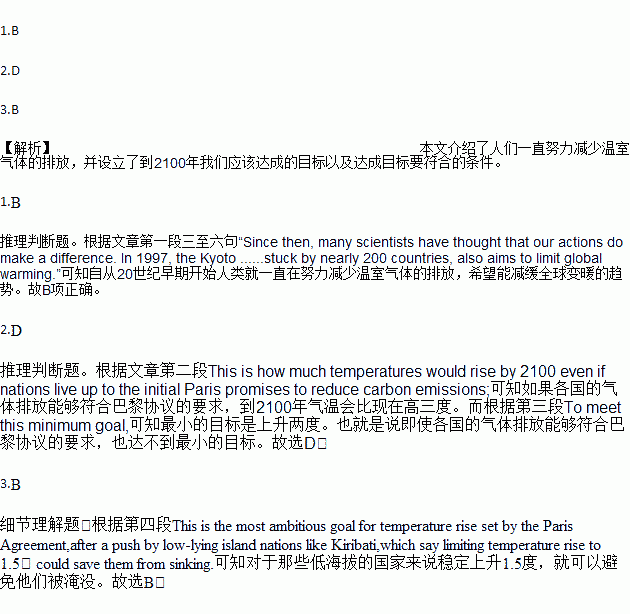题目内容
Is there link between humans and climate change or not?This question was first studied in the early 1900s.Since then,many scientists have thought that our actions do make a difference.In 1997,the Kyoto Protocol explained our role in the Earth's changing atmosphere and set international limits for gas emissions from 2008 to 2012.Some countries have decided to continue these reductions until 2020.More recently,the Paris Agreement,struck by nearly 200 countries,also aims to limit global warming.But just now how much warmer it will get depends on how deeply countries cut carbon emissions.

This is how much temperatures would rise by 2100 even if nations live up to the initial Paris promises to reduce carbon emissions;this rise could still put coastal cities under water and drive over half of all species to extinction.
To meet this minimum goal,the Agreement requires countries to tighten emissions targets every five years.Even this increase could sink some islands,worsen drought and drive a decline of up to a third in the number of species.
This is the most ambitious goal for temperature rise set by the Paris Agreement,after a push by low-lying island nations like Kiribati,which say limiting temperature rise to 1.5℃ could save them from sinking.
This is how much temperatures have risen since the industrial age began,putting us 40% of the way to the 2℃ point.
The baseline here is average global temperature before the start of the industrial age.
1.It can be concluded from paragraph 1 that .
A. gas emissions have been effectively reduced in developed countries
B. humans have made continuous efforts to slow down global warming
C. the problem of global warming will have been quite solved by 2020
D. the Paris Agreement is more influential than the Kyoto Protocol
2.If nations could only keep the initial promises of the Paris Agreement,what would happen by the year 2100?
A. The human population would increase by one third.
B. Little over 50 % of all species would still exist.
C. Nations would not need to tighten their emissions targets.
D. The Agreement’s minimum goal would not be reached.
3.If those island nations not far above sea level are to survive,the maximum temperature rise,since the start of the industrial age,should be .
A. 0.8℃ B. 1.5℃ C. 2℃ D. 3.5℃
 小学生10分钟口算测试100分系列答案
小学生10分钟口算测试100分系列答案
